- Home
- T. Kingfisher
Paladin’s Hope: Book Three of the Saint of Steel
Paladin’s Hope: Book Three of the Saint of Steel Read online
Praise for T. Kingfisher
“Dive in...if you are looking to be charmed and delighted.”
Locus
“…[A] knack for creating colorful, instantly memorable characters, and inhuman creatures capable of inspiring awe and wonder.”
NPR Books
"The writing. It is superb. T. Kingfisher, where have you been all my life?"
The Book Smugglers
Paladin’s Hope
Book Three of the Saint of Steel
T. Kingfisher
Copyright © 2021 by T. Kingfisher
Published by Red Wombat Studio
All rights reserved.
No part of this book may be reproduced in any form or by any electronic or mechanical means, including information storage and retrieval systems, without written permission from the author, except for the use of brief quotations in a book review.
Created with Vellum
For Cousin Amy
Contents
Chapter 1
Chapter 2
Chapter 3
Chapter 4
Chapter 5
Chapter 6
Chapter 7
Chapter 8
Chapter 9
Chapter 10
Chapter 11
Chapter 12
Chapter 13
Chapter 14
Chapter 15
Chapter 16
Chapter 17
Chapter 18
Chapter 19
Chapter 20
Chapter 21
Chapter 22
Chapter 23
Chapter 24
Chapter 25
Chapter 26
Chapter 27
Chapter 28
Chapter 29
Chapter 30
Chapter 31
Chapter 32
Chapter 33
Chapter 34
Chapter 35
Chapter 36
Chapter 37
Epilogue
About the Author
Also by T. Kingfisher
One
It was early morning on the banks of the Elkinslough River. Mist hung heavily over the brown water, turning it briefly pale and disguising the muddiness of the flow. Five men stood on the city-side bank, looking at a corpse.
Four of the men were human, one was not. That member of the group was a gnole, one of the short, stripe-faced badger people. Despite their species and the nearly three foot difference in their height, there was something about both the gnole and one of the men that marked them as similar. They wore identical badges that marked them as members of the city guard, but more than that, they stood alike and they had the same watchful, suspicious air about them.
Two of the remaining men were also similar in the same indefinable fashion. They had impeccable military posture and wore chain and tabards. Their cloaks marked them as servants to a dead god. One was of average height, with dark hair, the other a fraction shorter, with auburn red hair that stood out like fresh blood against the mist.
The last of the five was the only one who did not share a certain martial quality. He was slim and well-groomed and would be considered handsome, but he was also extraordinarily pale, as if he lived his life underground.
It was this fifth man who nudged the corpse with the toe of his boot and said, “Well, if you want my professional opinion, this great goddamn hole in his chest is probably what killed him.”
* * *
Doctor Piper dealt with corpses and for the most part, he preferred them to the living. He didn’t mind living people, he was perfectly happy to meet them and talk to them and even work with them, but corpses never, ever asked stupid questions. You learned to appreciate that when you spent all day analyzing why and how people had died. The dead didn’t say things like, “Are you sure he’s dead?” when the man’s head was half off or, “Dear god, what happened?” when it was bloody obvious that someone had shoved a sword through him. The dead just laid there and got on with being dead.
He definitely preferred them to the city guard. Piper was suspicious of power, particularly power that thought it was the arbiter of justice. He knew Captain Mallory well enough to know that the man was that rarest of creatures, an honest policeman, but that simply meant that his dislike was tempered with pity. Mallory did not engage in graft or extortion and for this sin, he had been assigned the poorest and most crime-riddled quarter of the city, where he could be handily forgotten until his superiors decided they needed someone to blame.
The two paladins were different. Paladins were god-touched and thus could make a much better case for being arbiters of justice, since presumably a higher power was doing the actual arbitration. These two happened to work for the Temple of the White Rat. Stephen, the taller one, he’d met before. The good-looking red-haired fellow was new, but was cut from the same cloth as Stephen, which meant that he might well go into a battle-madness that could level a town but would feel extremely guilty about it afterwards.
The corpse was a corpse. Something very large had punched through the man’s body, back to front, exploding ribs outward. Probably it had exploded guts outward too, but after a day or two in the river, most of those bits had gone missing. The fish had gotten a good meal there. They’d gotten his eyes, too. It was fairly gruesome, but you got used to that sort of thing. Normally bodies were brought to Piper’s workroom, in a cool subterranean storage room near the Archon’s palace, but it was fairly obvious that moving this one would cause it to fall apart, so they’d sent a runner for him to come to the river.
“Any idea what happened to him?” asked Captain Mallory.
Piper shrugged. “If somebody stabbed him in the heart and then tore his chest open, I couldn’t tell you.” He squatted down. Drowning was always so unpleasant. Things got soggy and bloated. The dead man hadn’t been in the water long enough to get truly nasty and the water was cold enough to keep decay to a minimum, but it still wasn’t pretty. “I can tell you he’s been in the water a day, maybe a day and a half. Not much more than that.”
“How do you know?”
Piper nudged the man with his boot again. “The catfish haven’t cored him out completely. If he’d been in there for two days, he’d be mostly catfish by weight.”
“A human isn’t joking,” said the gnole constable, nodding to Piper. “A gnole has seen catfish eating.” Stephen the paladin rubbed his hand over his face.
“We do have exceedingly voracious catfish,” said the red-head, with understandable civic pride.
“What could have made a wound like that?” asked Mallory, refusing to be sidetracked by the local ichthyology.
Piper studied the wound. Even assuming that the local fish population had been at work, there had been a great deal of trauma to begin with. The man’s chest looked as if it had exploded outward. “Something big,” he said. “Someone help me roll him over?”
The two paladins immediately took an end and flipped the corpse over. Mallory scowled but didn’t argue.
The corpse’s back was ragged, his head bashed and misshapen. Whatever had taken out his back had gone in at an angle, only just missed the spine, and left a gaping hole the size of Piper’s fists. “Most of this is from being banged about after he died,” said Piper, squatting down next to the body. It stank, but they always did. He wiped his nose.
“A warhammer could have caused the chest to break outward,” said Stephen, “but it doesn’t punch a hole in the back like that. Perhaps some kind of maul with a sharpened end?”
“Gored by a bull?” asked the red-head.
“That might do it.” Piper nodded up at him. “Didn’t catch
your name?”
“Galen. Formerly of the Saint of Steel, now I serve the Temple.”
“Yes, I figured that much.” Piper gave him a brief smile. He really was very good-looking. Cheekbones you could slice cheese on.
“That would be a remarkable bull,” said Mallory. “To make a hole that size.”
“There’s still some aurochs in the woods upstream,” said Stephen. “Or a demon could have taken a normal cow. They do like to possess livestock.” Mallory grunted.
Piper looked down at the body. He didn’t want to do the trick. He could do it, but it was unpleasant and none of these men were stupid and might have questions about why he was touching a dead body with his bare hands and getting a vague expression.
Anyway, it wasn’t as if the cause of death was all that mysterious. Piper was pretty sure that the man’s last sensation had been of being struck very hard in the back. It might not even have had time to hurt.
He pulled out his dagger and leaned forward, probing at the wound. There was something inside, which might be a very disgruntled catfish, but might be significant. “Hmmm…” Too deep in the wound to get with a dagger. He slid two gloved fingers inside, trying to get a grip on whatever it was. “Aha!”
When he looked up, Stephen was pointedly not looking at him. The paladin had turned slightly green.
“What are you getting squeamish about?” asked Piper. “You’ve seen dead bodies. You’ve made dead bodies.”
“Yes, but I didn’t poke around in them afterwards.”
“Feh.” Piper extracted his prize. “Bone chip. Damn.”
“Let me see.” Mallory crouched down next to him. “It looks like it, yes.”
Piper did not say something sarcastic about being grateful that the guard captain had confirmed what he, a doctor, had already identified. He considered this a great victory of restraint.
“Knocked off by the weapon, then?” asked Galen.
“Seems likely. I was hoping for wood splinters, honestly, then I could tell you it was a sharpened stake or a spear.” He turned the bit of bone over in his fingers, frowning. “It’s a long chip, though. I won’t swear he wasn’t impaled on some kind of sharpened bone.”
“So it might have been an accident?” asked Mallory hopefully.
“Maybe.” Piper shrugged. “I suppose it could have been a supremely bad accident with a supremely pointy tree. Though I would suspect a very well-polished piece of wood, because trees tend to leave bits of bark in the wounds.”
“Could they have simply washed out?” asked Mallory.
“Anything’s possible,” said Piper, in a tone that hopefully conveyed, “Not a chance in hell.” The handsome red-haired paladin hid a smile.
“Why would someone shove a polished stake through him?” asked Mallory, not rising to the bait.
“Maybe they thought he was a vampire.”
“A stake the size of a man’s thigh, though?” Stephen sounded doubtful.
“Perhaps they wanted to be thorough.”
Mallory grunted. The one advantage police had over paladins was that guards had no problem believing that someone would randomly shove pointy logs into other people. Paladins generally took a little longer to get there. Piper suspected that their sense of innocence and moral outrage kept regrowing, possibly through divine means.
“A gnole thinks this is one of the bodies,” said the gnole constable.
Piper looked over at the gnole, puzzled, but Mallory grunted again, apparently understanding. “The other two were decapitated,” he said.
Both paladins bristled. Piper felt his own stomach sink. “You mean from the smooth men?”
“No, no.” Mallory waved his hand. “Different sort of decapitation. Sorry. I realize we’re all a bit sensitive about that still.”
“Oh good, just a run-of-the-mill beheading,” said Galen dryly.
“I hear in other towns, they sometimes go whole weeks without anyone having their heads randomly chopped off,” said Piper.
Mallory scowled, and Piper realized too late that the guard captain was taking that as an insult. “No offense to your men,” he added hastily. “Those are all much smaller towns.”
“None taken,” said Mallory, in much the same tone that Piper had said, ‘Anything’s possible’. “I sometimes think of moving to one of those places. But those other two didn’t come from here. They washed up on the bank, just like this fellow did. Whatever killed him was upstream.”
“A body was in the water the same amount of time,” said the gnole constable. He reached out and tapped a claw on the dead man’s foot. “A body wore the same kind of boots.”
They all duly examined the boots. They were ordinary leather, not particularly distinguished, the kind sewn inside out so that the seams didn’t leak.
“Everybody wears leather boots,” said Mallory.
The gnole reached up with one hand and smoothed his whiskers down. In a human, it would have been a fussy little gesture. Piper rather suspected that in a gnole, it was the equivalent of taking a deep breath so that you didn’t yell. “A job-human wears wooden soles. A rag-and-bone human wears wooden soles. Even a sword-human—” he nodded to the two paladins “—wear wooden soles.”
All four humans looked down at their own feet. They were all wearing leather boots with wooden soles. Stephen tapped his foot and it made a characteristic clicking sound.
“Clerks wear leather soles,” said Galen thoughtfully. “Lawyers. Priests who don’t go outside a great deal. If you’re inside and can afford it, you change your shoes. These are indoor shoes, then?”
“So somebody rammed a stake through him indoors…” murmured Stephen.
“Or he went outside not expecting to be long,” said Mallory. “Or he couldn’t afford a better—no, that doesn’t make any sense, wooden soles are cheaper and last longer, leather has to be fitted.” He rubbed his face. “All right, Earstripe, you’ve convinced me. The shoes might be significant.”
“Not many bulls goring people indoors,” said Galen.
“Thank you for that exceedingly helpful observation, Paladin Galen.”
“I live to serve.”
“And thank you for your time, doctor,” said Mallory, in clear dismissal. “And thank you, gentlemen, for being so kind as to bring Doctor Piper to us. We won’t detain you any longer.”
“Our honor is to serve,” said Stephen, putting a fist over his heart. Unlike Galen, he actually seemed to mean it. Piper felt a wash of secondhand embarrassment.
He took a little extra time standing up, cleaning his gloves first and poking the body a few more times, not because he expected to learn anything but because the dismissal had annoyed him. Still, there wasn’t much more that he could do.
“Do you require an escort back, doctor?” asked Stephen.
“No,” said Piper. “Since I’m out here, I might as well pick up something for dinner.”
“I’m amazed you can think of dinner,” muttered Galen. “Or fish.”
“The dead are dead,” said Piper, not bothering to mention that he definitely wouldn’t be eating fish. “The living still need to eat.” He nodded to the paladins and the guards and turned away, still thinking vaguely about bone chips and leather soles and things that did not quite add up together.
Two
“Is it just me,” asked Galen, as the two paladins left the docks together, “or was Mallory distinctly chilly toward me just now?”
Stephen gave him a thoughtful look. “You’ve been gone a while,” he said.
“Oh, you noticed?”
Stephen rolled his eyes. Galen struck a tragic pose. “Months up north, frozen hellscape, terrible food, actual honest-to-god shapeshifters, and all I get is ‘oh, you’ve been gone a while.’ I’ll have you know, I nearly died on multiple occasions.”
“And how is that any different than normal?”
“There were nuns.”
“Mmm.”
“A round dozen of them. I had to escort them back
to their convent, then spend a month lugging rocks around helping them rebuild it. And Istvhan was no help at all. He and his lady love were making calf-eyes at each other the whole time, when they weren’t sneaking off every five minutes to play hide-the-bratwurst.”
“It’s nice that he’s happy.”
“Disgustingly so.” Galen gave up. Stephen did have a sense of humor, unlike some of the other former paladins, but he was clearly not in a bantering mood. “So what’s been happening while I was freezing my balls off?”
“The Bishop,” said Stephen.
Galen grinned. Bishop Beartongue was the leader of the Temple of the White Rat within Archenhold. She was a pleasant, soft-spoken older woman who devoted most of her time to solving administrative problems. She also had a mind like a razor and the ruthlessness of a hired killer. Galen would have laid his life down for her without hesitation.
“So what did the Bishop do to get Mallory pissed at her?”
“It’s not just Mallory. If you think he’s chilly, the other guard captains will give you frostbite. She’s been pushing for better recordkeeping by the guard. Wanted someone in each guard station to record arrests, make copies, and keep a central log. Apparently a few too many people have been sitting in cells because the guard ‘forgot’ how long they’d been in there.” Stephen smiled grimly. “Shane was on honor guard duty the day she presented all her arguments to the Archon. Apparently the head of the guard—that’s Commander Tamsin now, Commander Burge retired while you were up north—said that he’d be more than happy to do it, he could absolutely understand her concerns, but of course much of the guard was not terribly literate and the budget was stretched thin, so unless she wanted to pay for trained scribes at each guard station, he just didn’t see how he could accommodate.”

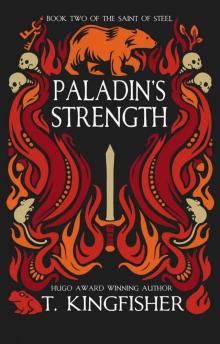 Paladin's Strength
Paladin's Strength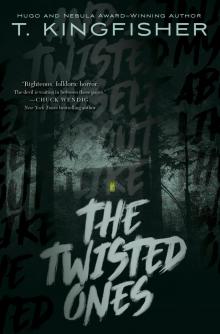 The Twisted Ones
The Twisted Ones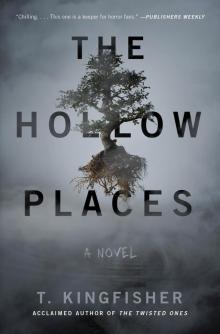 The Hollow Places
The Hollow Places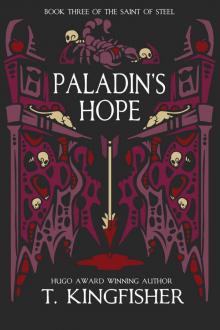 Paladin’s Hope: Book Three of the Saint of Steel
Paladin’s Hope: Book Three of the Saint of Steel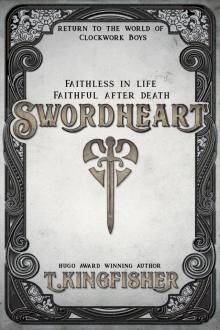 Swordheart
Swordheart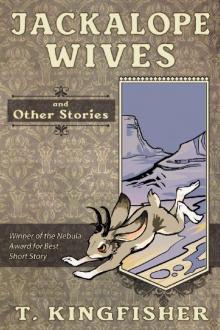 Jackalope Wives And Other Stories
Jackalope Wives And Other Stories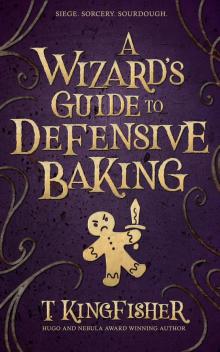 A Wizard's Guide to Defensive Baking
A Wizard's Guide to Defensive Baking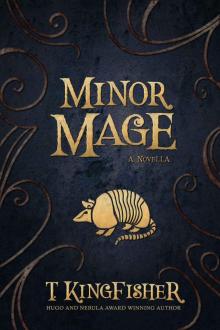 Minor Mage
Minor Mage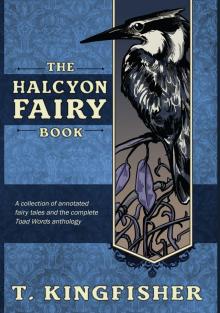 The Halcyon Fairy Book
The Halcyon Fairy Book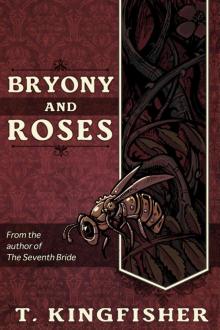 Bryony and Roses
Bryony and Roses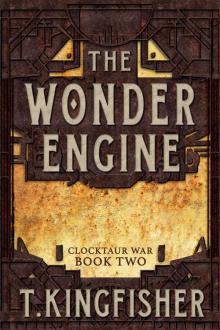 The Wonder Engine_Book Two of the Clocktaur War
The Wonder Engine_Book Two of the Clocktaur War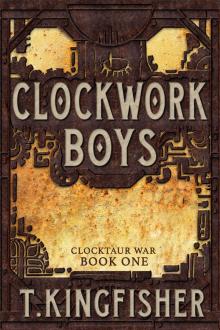 Clockwork Boys: Book One of the Clocktaur War
Clockwork Boys: Book One of the Clocktaur War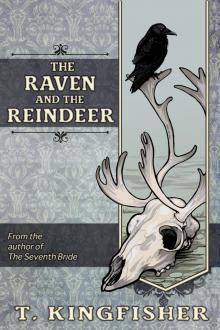 The Raven and the Reindeer
The Raven and the Reindeer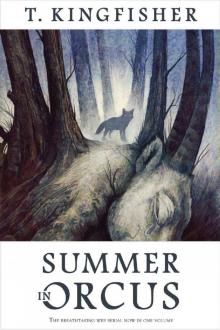 Summer in Orcus
Summer in Orcus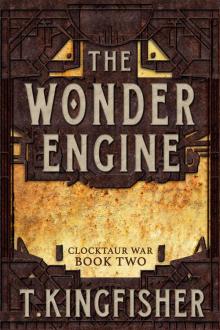 The Wonder Engine
The Wonder Engine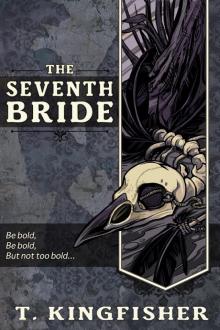 Seventh Bride
Seventh Bride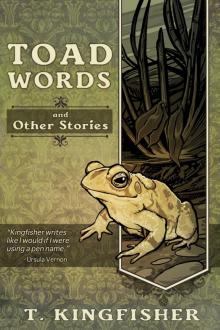 Toad Words
Toad Words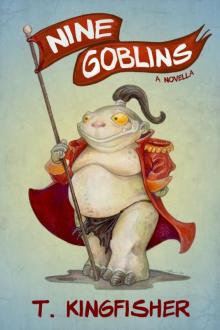 Nine Goblins
Nine Goblins